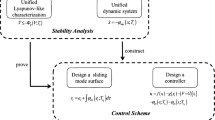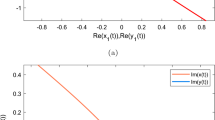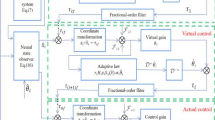Abstract
This paper focuses on the pth moment stochastic exponential anti-synchronization problem for delayed complex-valued neural networks (CVNNs). By combining It\(\hat{\mathrm{o}}\)’s differential formula, Halanay inequality and some inequalities techniques, via the designed delay-dependent controller, two different criteria are presented for guaranteeing pth moment anti-synchronization exponentially of the addressed systems by constructing appropriate Lyapunov functionals. Different from the previous works, the anti-synchronization control problem is addressed for CVNNs with the simultaneous existence of stochastic disturbances and time delays. Similar results can also be obtained for delayed CVNNs without stochastic disturbances or real-valued ones. The in-depth analysis results improve and extend some in the existing literature. In the end, two simulation examples are provided to show the effectiveness of the obtained results.










Similar content being viewed by others
References
Lin, W., Chen, G.R.: Large memory capacity in chaotic artificial neural networks: a view of the antiintegrable limit. IEEE Trans. Neural Netw. 20(8), 1340–1351 (2009)
Wang, L.M., Ge, M.F., Hu, J.H., Zhang, G.D.: Global stability and stabilization for inertial memristive neural networks with unbounded distributed delays. Nonlinear Dyn. 95(2), 943–955 (2019)
Liu, P., Zeng, Z.G., Wang, J.: Global synchronization of coupled fractional-order recurrent neural networks. IEEE Trans. Neural Netw. Learn. Syst. (2018). https://doi.org/10.1109/TNNLS.2018.2884620
Liu, L., Cao, J.D., Qian, C.: \(p\)th moment exponential input-to-state stability of delayed recurrent neural networks with markovian switching via vector Lyapunov function. IEEE Trans. Neural Netw. Learn. Syst. 29(7), 3152–3163 (2018)
Chen, J., Park, J.H., Xu, S.Y.: Stability analysis for delayed neural networks with an improved general free-matrix-based integral inequality. IEEE Trans. Neural Netw. Learn. Syst. (2019). https://doi.org/10.1109/TNNLS.2019.2909350
Xiong, J.J., G Zhang, G.B.: Improved stability criterion for recurrent neural networks with time-varying delays. IEEE Trans. Neural Netw. Learn. Syst. 29(11), 5756–5760 (2018)
Kanter, I., Kinzel, W., Kanter, E.: Secure exchange of information by synchronization of neural networks. Europhys. Lett. 57(1), 141–147 (2002)
Parlitz, U., Chua, L.O., Kocarev, L., Halle, K.S., Shang, A.: Transmission of digital signals by chaotic synchronization. Int. J. Bifurcat. Chaos 2(4), 973–977 (1992)
Pecora, L.M., Carroll, T.L.: Synchronization in chaotic systems. Phys. Rev. Lett. 64, 821–824 (1990)
Ma, Q., Xu, S.Y., Zou, Y., Shi, G.D.: Synchronization of stochastic chaotic neural networks with reaction-diffusion terms. Nonlinear Dyn. 67, 2183–2196 (2012)
Yang, X.S., Feng, Y.M., Yiu, K.F.C., Song, Q., Alsaadi, F.E.: Synchronization of coupled neural networks with infinite-time distributed delays via quantized intermittent pinning control. Nonlinear Dyn. 94, 2289–2303 (2018)
Taherion, S., Lai, Y.C.: Observability of lag synchronization of coupled chaotic oscillators. Phys. Rev. E 59, 6247–6250 (1999)
Wu, H.Q., Zhang, L.Y., Ding, S.B., Guo, X.Q., Wang, L.L.: Complete periodic synchronization of memristor-based neural networks with time-varying delays. Can. J. Phys. 92(11), 1337–1349 (2014)
Zhang, G.D., Shen, Y., Wang, L.M.: Global anti-synchronization of a class of chaotic memristive neural networks with time-varying delays. Neural Netw. 46, 1–8 (2013)
Wang, W.P., Li, L.X., Peng, H.P., Wang, W.N., Kurths, J., Xiao, J.H., Yang, Y.X.: Anti-synchronization of coupled memristive neutral-type neural networks with mixed time-varying delays via randomly occurring control. Nonlinear Dyn. 83, 2143–2155 (2016)
Xing, W., Shi, P., Agarwal, R.K., Zhao, Y.X.: A survey on global pinning synchronization of complex networks. J. Franklin I(356), 3590–3611 (2019)
Wedekind, I., Parlitz, U.: Experimental observation of synchronization and anti-synchronization of chaotic lowfrequency- fluctuations in external cavity semiconductor lasers. Int. J. Bifurcation Chaos 11, 1141–1147 (2001)
Wang, W.P., Li, L.X., Peng, H.P., Kurths, J., Xiao, J.H., Yang, Y.X.: Anti-synchronization control of memristive neural networks with multiple proportional delays. Neural Process. Lett. 43, 269–283 (2016)
Sakthivel, R., Anbuvithya, R., Mathiyalagan, K., Ma, Y.K., Prakash, P.: Reliable anti-synchronization conditions for BAM memristive neural networks with different memductance functions. Appl. Math. Comput. 275, 213–228 (2016)
Cao, Y.T., Wen, S.P., Chen, M.Z.Q., Huang, T.W., Zeng, Z.G.: New results on anti-synchronization of switched neural networks with time-varying delays and lag signals. Neural Netw. 81, 52–58 (2016)
Sáchez, E., Matias, M.A., Muñuzuri, V.: Analysis of synchronization of chaotic systems by noise: an experimental study. Phys. Rev. E 56, 4068–4071 (1997)
Wang, F., Chen, Y.L., Liu, M.C.: pth Moment exponential stability of stochastic memristor-based bidirectional associative memory (BAM) neural networks with time delays. Neural Netw. 98, 192–202 (2018)
Chen, G.L., Li, D.S., Shi, L., Van Gaans, O., Verduyn Lunel, S.: Stability results for stochastic delayed recurrent neural networks with discrete and distributed delays. J. Differ. Equ. 264, 3864–3898 (2018)
Zhang, W.L., Yang, S.J., Li, C.D., Zhang, W., Yang, X.S.: Stochastic exponential synchronization of memristive neural networks with time-varying delays via quantized control. Neural Netw. 104, 93–103 (2018)
Xing, W., Shi, P., Song, H.Y., Zhao, Y.X., Li, L.Y.: Global pinning synchronization of stochastic delayed complex networks. Inf. Sci. 490, 113–125 (2019)
Ren, F.L., Cao, J.D.: Anti-synchronization of stochastic perturbed delayed chaotic neural networks. Neural Comput. Appl. 18, 515–521 (2009)
Wang, W.P., Li, L.X., Peng, H.P., Kurths, J., Xiao, J.H., Yang, Y.X.: Finite-time anti-synchronization control of memristive neural networks with stochastic perturbations. Neural Process. Lett. 43, 49–63 (2016)
Zheng, C.D., Liang, W.L., Wang, Z.S.: Anti-synchronization of markovian jumping stochastic chaotic neural networks with mixed time delays. Circ. Syst. Signal Process. 33, 2761–2792 (2014)
Hirose, A., Yoshida, S.: Generalization characteristics of complex-valued feedforward neural networks in relation to signal coherence. IEEE Trans. Neural Netw. 23, 541–551 (2012)
Hirose, A.: Recent progress in applications of complex-valued neural networks. In: Proceedings of the 10th International Conference on Artificial Intelligence and Soft Computing: part II, pp. 42–46 (2010)
Nitta, T.: Solving the XOR problem and the detection of symmetry using a single complex-valued neuron. Neural Netw. 16(8), 1101–1105 (2003)
Zhang, Z.Y., Guo, R.N., Liu, X.P., Lin, C.: Lagrange exponential stability of complex-valued BAM neural networks with time-varying delays. IEEE Trans. Syst. Man Cybern. Syst. (2018). https://doi.org/10.1109/TSMC.2018.2840091
Wang, H.M., Duan, S.K., Huang, T.W., Wang, L.D., Li, C.D.: Exponential stability of complex-valued memristive recurrent neural networks. IEEE Trans. Neural Netw. Learn. Syst. 28(3), 766–771 (2017)
Guo, R.N., Zhang, Z.Y., Liu, X.P., Lin, C.: Existence, uniqueness, and exponential stability analysis for complex-valued memristor-based BAM neural networks with time delays. Appl. Math. Comput. 311, 100–117 (2017)
Zhang, Z.Y., Lin, C., Chen, B.: Global stability criterion for delayed complex-valued recurrent neural networks. IEEE Trans. Neural Netw. Learn. Syst. 25(9), 1704–1708 (2014)
Xu, D.S., Tan, M.C.: Delay-independent stability criteria for complex-valued BAM neutral-type neural networks with time delays. Nonlinear Dyn. 89, 819–832 (2017)
Liu, Y.F., Tan, M.C., Xu, D.S.: Coexistence and local \(\mu \)-stability of multiple equilibrium points for complex-valued Cohen–Grossberg neural networks with unbounded time-varying delays. Nonlinear Dyn. 91, 2369–2388 (2018)
Guo, R.N., Zhang, Z.Y., Liu, X.P., Lin, C., Wang, H.X., Chen, J.: Exponential input-to-state stability for complex-valued memristor-based BAM neural networks with multiple time-varying delays. Neurocomputing 275, 2041–2054 (2018)
Wan, P., Jian, J.G., Mei, J.: Periodically intermittent control strategies for \(\alpha \)-exponential stabilization of fractional-order complex-valued delayed neural networks. Nonlinear Dyn. 92, 247–265 (2018)
Li, X.D., Rakkiyappan, R., Velmurugan, G.: Dissipativity analysis of memristor-based complex-valued neural networks with time-varying delays. Inf. Sci. 294, 645–665 (2015)
Zhang, Z.Y., Liu, X.P., Zhou, D.H., Lin, C., Chen, J., Wang, H.X.: Finite-time stabilizability and instabilizability for complex-valued memristive neural networks with time delays. IEEE Trans. Syst. Man Cybern. Syst. 48(12), 2371–2382 (2018)
Bao, H.B., Park, J.H., Cao, J.D.: Synchronization of fractional-order complex-valued neural networks with time delay. Neural Netw. 81, 16–28 (2016)
Hu, J., Zeng, C.N.: Adaptive exponential synchronization of complex-valued Cohen–Grossberg neural networks with known and unknown parameters. Neural Netw. 86, 90–101 (2017)
Chen, J.J., Chen, B.S., Zeng, Z.G.: Global asymptotic stability and adaptive ultimate Mittag–Leffler synchronization for a fractional-order complex-valued memristive neural networks with delays. IEEE Trans. Syst. Man Cybern. Syst. (2018). https://doi.org/10.1109/TSMC.2018.2836952
Zhang, Z.Y., Liu, X.P., Lin, C., Chen, B.: Finite-time synchronization for complex-valued recurrent neural networks with time delays. Complexity Article ID 8456737 (2018)
Liu, D., Zhu, S., Sun, K.L.: Global anti-synchronization of complex-valued memristive neural networks with time delays. IEEE Trans. Cybern. 49(5), 1735–1747 (2019)
Liu, D., Zhu, S., Sun, K.L.: Anti-synchronization of complex-valued memristor-based delayed neural networks. Neural Netw. 105, 1–13 (2018)
Liu, D., Zhu, S., Chang, W.T.: Mean square exponential input-to-state stability of stochastic memristive complex-valued neural networks with time varying delay. Int. J. Syst. Sci. 487, 1966–1977 (2017)
Guo, J., Meng, Z.D., Xiang, Z.R.: Passivity analysis of stochastic memristor-based complex-valued recurrent neural networks with mixed time-varying delays. Neural Process. Lett. 47(3), 1097–1113 (2018)
Liu, D., Zhu, S., Chang, W.T.: Global exponential stability of stochastic memristor-based complex-valued neural networks with time delays. Nonlinear Dyn. 90, 915–934 (2017)
Sriraman, R., Cao, Y., Samidurai, R.: Global asymptotic stability of stochastic complex-valued neural networks with probabilistic time-varying delays. Math. Comput. Simulat. (2019). https://doi.org/10.1016/j.matcom.2019.04.001
Gong, W.Q., Liang, J.L., Kan, X., Wang, L., Dobaie, A.M.: Robust state estimation for stochastic complex-valued neural networks with sampled-data. Neural Comput. Appl. 31, 523–542 (2019)
Zhang, L., Yang, X.S., Xu, C., Feng, J.W.: Exponential synchronization of complex-valued complex networks with time-varying delays and stochastic perturbations via time-delayed impulsive control. Appl. Math. Comput. 306, 22–30 (2017)
Acknowledgements
This work was supported by the NSFC 61673215, 61374087, the 333 Project (BRA2017380), a Project Funded by the Priority Academic Program Development of Jiangsu, the Key Laboratory of Jiangsu Province.
Author information
Authors and Affiliations
Corresponding author
Ethics declarations
Conflict of interest
The authors declare that they have no conflict of interest.
Additional information
Publisher's Note
Springer Nature remains neutral with regard to jurisdictional claims in published maps and institutional affiliations.
Appendices
Appendix I
By combining Assumptions 1 and 2 with Lemma 1, it follows that
where
Further, one can derive
where
Here, define
By (12), there must exist a sufficiently small number \(\epsilon >0\) such that
Then, according to (33)–(35), it is easy to obtain
Appendix II
From (10) and Lemma 1, (24) can be bounded as
Consequently, we deduce
where
Rights and permissions
About this article
Cite this article
Guo, R., Xu, S. & Lv, W. \({\varvec{p}}\)th moment stochastic exponential anti-synchronization of delayed complex-valued neural networks. Nonlinear Dyn 100, 1257–1274 (2020). https://doi.org/10.1007/s11071-020-05583-w
Received:
Accepted:
Published:
Issue Date:
DOI: https://doi.org/10.1007/s11071-020-05583-w




